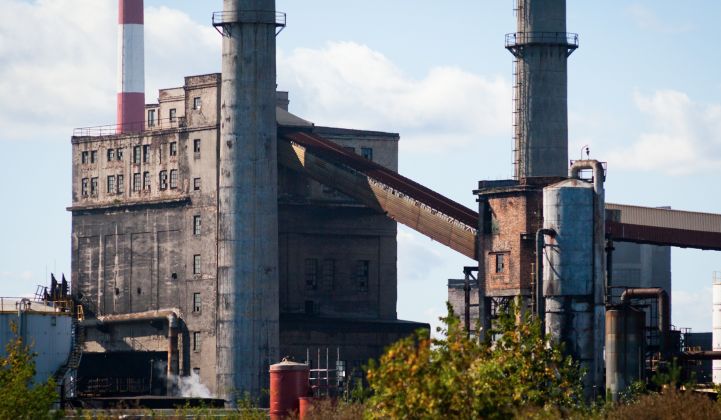Federal regulators have rejected Energy Secretary Rick Perry’s plan to rewrite energy market regulations that would favor the coal industry in the name of grid reliability, delivering a stark rebuke to what has largely been seen as an effort to reward the coal industry at the expense of ratepayers and the environment.
On Monday, the Federal Energy Regulatory Commission issued an order (PDF) terminating Docket No. RM18-1-000, the proceeding it set up to review DOE’s notice of proposed rulemaking, or NOPR. The notorious document, first filed in late September, united oil and gas industries with wind, solar and clean power advocates in opposition to its plan to provide cost recovery to power plants with at least 90 days supply of fuel on hand -- something that only applies to coal and nuclear plants.
DOE claimed this was needed to prevent immediate dangers to grid resiliency caused by the rising number of retiring coal and nuclear power plants. But Monday’s order, filed unexpectedly just two days before FERC’s deadline for making a decision, found that DOE hasn’t marshaled the evidence that the existing market rules are “unjust and unreasonable,” a key bar for making the radical changes it suggests.
Importantly, FERC’s order notes that DOE failed to provide evidence to back Perry’s claims that retiring coal and nuclear plants represented an existential threat to grid reliability and “resilience,” one it used the justify its demand for FERC to act outside of its usual channels to make changes within a matter of months.
“While some commenters allege grid resilience or reliability issues due to potential retirements of particular resources, we find that these assertions do not demonstrate the unjustness or unreasonableness of the existing RTO/ISO tariffs,” FERC’s order noted. “In addition, the extensive comments submitted by the RTOs/ISOs do not point to any past or planned generator retirements that may be a threat to grid resilience.”
Even the DOE’s own grid reliability study, carried out on Perry’s orders and cited to justify the NOPR, “concluded that changes in the generation mix, including the retirement of coal and nuclear generators, have not diminished the grid’s reliability or otherwise posed a significant and immediate threat to the resilience of the electric grid,” FERC wrote.
The order also noted that DOE’s proposed remedy, to offer cost-recovery status to power plants “regardless of need or cost to the system,” didn’t meet the bar of being a just and reasonable replacement. Multiple analyses of the NOPR’s proposed changes found that they could add billions of dollars per year to energy costs for ratepayers in the grid markets most affected, while providing no appreciable improvement to grid reliability.
“FERC also stated the cost recovery aspect of DOE’s proposal paying generators for 90 days of fuel on site would be unjust and unreasonable -- our research showed up to $10.8 billion in new consumer costs from this subsidy,” Robbie Orvis, policy design project manager at Energy Innovation, wrote in a Monday email.
DOE’s NOPR did earn support from utilities, communities and labor unions with significant links to the coal industry. But it was opposed by a broad swath of energy industry groups, independent analysts, and former FERC commissioners from both sides of the aisle, on the grounds that it could “blow up” energy markets and undercut decades of regulatory precedent, all with scant evidence that it would do anything to make the grid more reliable.
Monday’s order doesn’t dismiss the issue of grid reliability, however. In the same paragraph that terminates the proceeding set up to consider the NOPR, FERC initiated a new one -- Docket No. AD18-7-000 -- to “specifically evaluate the resilience of the bulk power system in the regions operated by regional transmission organizations and independent system operators.”
FERC’s action was greeted with relief by environmental groups and energy advocates who’d been closely watching the deliberations.
“FERC was right to reject the DOE’s costly and ill-considered proposal that would have undermined markets and an increasingly competitive, clean, and affordable electricity sector,” Michael Panfil, director of federal energy policy for the Environmental Defense Fund, said in a Monday statement. “FERC’s decision prioritizes deliberate, careful study over politicization.”
Gregory Wetstone, president and CEO of the American Council on Renewable Energy, wrote in a Monday statement that “FERC has laid out a sensible approach to gathering the vital information needed to support any changes to electricity markets. We are confident that, in the end, the record still will not support market intervention.”
Four of FERC’s five commission members are Trump administration appointees. But only one of them, former interim Chairman Neil Chatterjee, has been vocal in support of the NOPR’s contention that coal and nuclear “baseload” power plants are deserving of market intervention to maintain grid reliability.
In a separately written statement concurring with Monday’s order, Chatterjee did note his “concerns regarding bulk power system resilience in the interim period prior to the conclusion of the proceeding we initiate today,” noting that it could take several years to complete, and called for a process to learn if “interim measures may be needed.”
But this view wasn’t echoed by the two Democratic members of the commission who also wrote consenting statements, noted Ari Peskoe, a Harvard Law School senior fellow, in a series of tweets Monday.
Richard Glick, appointed by President Trump, wrote that the NOPR "had little, if anything, to do with resilience, and was instead aimed at subsidizing certain uncompetitive electric generation technologies.”
And Cheryl LaFleur, appointed by former President Obama, wrote that the NOPR “sought to freeze yesterday’s resources in place indefinitely, rather than adapting resilience to the resources that the market is selecting today or toward which it is trending in the future.”




